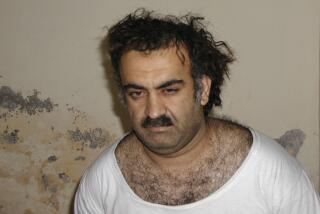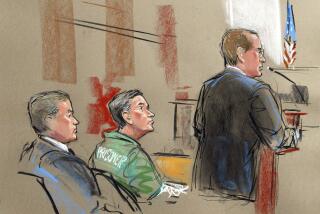Spy Suspect Rejects Talk of Plea Bargain
- Share via
WASHINGTON — Attorneys for Robert Philip Hanssen, the accused FBI spy, have abruptly rejected entreaties from federal prosecutors that they enter into a plea agreement and have told the government they are ready to proceed to trial on espionage charges.
The sticking point is the refusal of prosecutors to promise Hanssen before any plea that they would not ask a judge to impose the death penalty on him.
“We don’t feel they’re being as forthcoming on the death penalty issue as we would like,” defense attorney Plato Cacheris said in an interview Tuesday. As a result, any government desire to settle the case with a plea bargain is “a nonissue.”
Cacheris added he has rejected a request from prosecutors that he agree to extend a 90-day period in which an indictment must be returned to allow the government an additional 30 days before Hanssen is arraigned.
Without the 30-day extension, Hanssen is due to appear in court Monday on espionage charges that Cacheris believes will be returned by a federal grand jury later this week.
“We’re ready to go to trial,” he said.
Hanssen was arrested Feb. 18 based on an FBI affidavit that alleged he spied for Moscow for much of the last 15 years. He has been held without bail since then pending his indictment. Meanwhile, his lawyers have been given access to hundreds of government documents and secret letters written by Hanssen that prosecutors believe support their case.
One source--familiar with confidential discussions between Cacheris and Randy I. Bellows, the assistant U.S. attorney assigned to the case--said he hoped discussions about a plea bargain might resume after the indictment but before any trial, which likely would not be held before fall.
Bellows declined comment on the status of the case.
The same source, requesting anonymity because the discussions are confidential, pictured Bellows as being more amenable to waiving the death penalty in Hanssen’s case than are some of his superiors.
According to the source, Atty. Gen. John Ashcroft is particularly incensed that Hanssen, a veteran Justice Department employee and specialist in counterintelligence, would allegedly become a traitor.
For many years, the death penalty was not available to federal prosecutors of peacetime espionage cases. But the case against CIA spy Aldrich H. Ames in 1994 led to changes in the law.
After Ames’ guilty plea in return for a lenient five-year sentence for his wife, Rosario, an admitted accomplice, Congress amended espionage statutes to provide capital punishment for any spy who had caused the death of secret agents working for the U.S., as Ames had done, or who had revealed U.S. nuclear secrets. Ames, whose plea was negotiated by Cacheris, is serving a life sentence.
The FBI believes Hanssen helped the Russians unmask several “moles,” leading to the execution of two double agents working for the United States.
But Ames apparently disclosed their identities to the Russians in 1985, months before Hanssen could have confirmed their names, leading some lawyers to reason that capital punishment in Hanssen’s case may be on shaky ground.
A plea bargain for Hanssen, who is accused of spying in exchange for $1.4 million in cash and diamonds, could benefit the government as well as the defendant.
While prosecutors have said the case against Hanssen is built on “overwhelming” evidence gathered painstakingly by FBI agents, there are gaps in their knowledge that only Hanssen’s cooperation may be able to fill in.
In its affidavit filed in court in February, the FBI detailed Hanssen’s alleged contacts with Russian agents in the Washington area in the late 1980s and early 1990s.
But the affidavit is largely silent about the period from 1992 to mid-1999, suggesting there may be significant holes in what U.S. intelligence agents know about Hanssen’s activities.
John Martin, the longtime former head of the Justice Department’s anti-espionage unit, called the government’s negotiation posture “a horrible strategy.”
Martin, in an interview Tuesday, said prosecutors should abandon pressing for the death penalty. If they do, “then they will probably have a very quick disposition of the case, and the intelligence community will get the debriefings that they want.”
More to Read
Sign up for Essential California
The most important California stories and recommendations in your inbox every morning.
You may occasionally receive promotional content from the Los Angeles Times.













